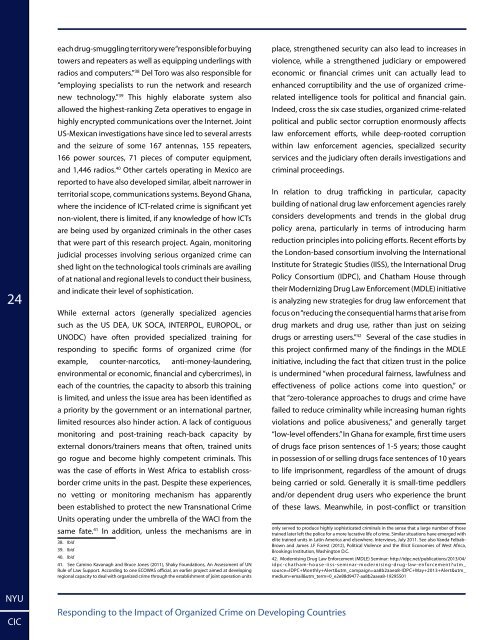here - Center on International Cooperation - New York University
here - Center on International Cooperation - New York University
here - Center on International Cooperation - New York University
You also want an ePaper? Increase the reach of your titles
YUMPU automatically turns print PDFs into web optimized ePapers that Google loves.
24<br />
each drug-smuggling territory were “resp<strong>on</strong>sible for buying<br />
towers and repeaters as well as equipping underlings with<br />
radios and computers.” 38 Del Toro was also resp<strong>on</strong>sible for<br />
“employing specialists to run the network and research<br />
new technology.” 39 This highly elaborate system also<br />
allowed the highest-ranking Zeta operatives to engage in<br />
highly encrypted communicati<strong>on</strong>s over the Internet. Joint<br />
US-Mexican investigati<strong>on</strong>s have since led to several arrests<br />
and the seizure of some 167 antennas, 155 repeaters,<br />
166 power sources, 71 pieces of computer equipment,<br />
and 1,446 radios. 40 Other cartels operating in Mexico are<br />
reported to have also developed similar, albeit narrower in<br />
territorial scope, communicati<strong>on</strong>s systems. Bey<strong>on</strong>d Ghana,<br />
w<str<strong>on</strong>g>here</str<strong>on</strong>g> the incidence of ICT-related crime is significant yet<br />
n<strong>on</strong>-violent, t<str<strong>on</strong>g>here</str<strong>on</strong>g> is limited, if any knowledge of how ICTs<br />
are being used by organized criminals in the other cases<br />
that were part of this research project. Again, m<strong>on</strong>itoring<br />
judicial processes involving serious organized crime can<br />
shed light <strong>on</strong> the technological tools criminals are availing<br />
of at nati<strong>on</strong>al and regi<strong>on</strong>al levels to c<strong>on</strong>duct their business,<br />
and indicate their level of sophisticati<strong>on</strong>.<br />
While external actors (generally specialized agencies<br />
such as the US DEA, UK SOCA, INTERPOL, EUROPOL, or<br />
UNODC) have often provided specialized training for<br />
resp<strong>on</strong>ding to specific forms of organized crime (for<br />
example, counter-narcotics, anti-m<strong>on</strong>ey-laundering,<br />
envir<strong>on</strong>mental or ec<strong>on</strong>omic, financial and cybercrimes), in<br />
each of the countries, the capacity to absorb this training<br />
is limited, and unless the issue area has been identified as<br />
a priority by the government or an internati<strong>on</strong>al partner,<br />
limited resources also hinder acti<strong>on</strong>. A lack of c<strong>on</strong>tiguous<br />
m<strong>on</strong>itoring and post-training reach-back capacity by<br />
external d<strong>on</strong>ors/trainers means that often, trained units<br />
go rogue and become highly competent criminals. This<br />
was the case of efforts in West Africa to establish crossborder<br />
crime units in the past. Despite these experiences,<br />
no vetting or m<strong>on</strong>itoring mechanism has apparently<br />
been established to protect the new Transnati<strong>on</strong>al Crime<br />
Units operating under the umbrella of the WACI from the<br />
same fate. 41 In additi<strong>on</strong>, unless the mechanisms are in<br />
38. Ibid<br />
39. Ibid<br />
40. Ibid<br />
41. See Camino Kavanagh and Bruce J<strong>on</strong>es (2011), Shaky Foundati<strong>on</strong>s, An Assessment of UN<br />
Rule of Law Support. According to <strong>on</strong>e ECOWAS official, an earlier project aimed at developing<br />
regi<strong>on</strong>al capacity to deal with organized crime through the establishment of joint operati<strong>on</strong> units<br />
place, strengthened security can also lead to increases in<br />
violence, while a strengthened judiciary or empowered<br />
ec<strong>on</strong>omic or financial crimes unit can actually lead to<br />
enhanced corruptibility and the use of organized crimerelated<br />
intelligence tools for political and financial gain.<br />
Indeed, cross the six case studies, organized crime-related<br />
political and public sector corrupti<strong>on</strong> enormously affects<br />
law enforcement efforts, while deep-rooted corrupti<strong>on</strong><br />
within law enforcement agencies, specialized security<br />
services and the judiciary often derails investigati<strong>on</strong>s and<br />
criminal proceedings.<br />
In relati<strong>on</strong> to drug trafficking in particular, capacity<br />
building of nati<strong>on</strong>al drug law enforcement agencies rarely<br />
c<strong>on</strong>siders developments and trends in the global drug<br />
policy arena, particularly in terms of introducing harm<br />
reducti<strong>on</strong> principles into policing efforts. Recent efforts by<br />
the L<strong>on</strong>d<strong>on</strong>-based c<strong>on</strong>sortium involving the Internati<strong>on</strong>al<br />
Institute for Strategic Studies (IISS), the Internati<strong>on</strong>al Drug<br />
Policy C<strong>on</strong>sortium (IDPC), and Chatham House through<br />
their Modernizing Drug Law Enforcement (MDLE) initiative<br />
is analyzing new strategies for drug law enforcement that<br />
focus <strong>on</strong> “reducing the c<strong>on</strong>sequential harms that arise from<br />
drug markets and drug use, rather than just <strong>on</strong> seizing<br />
drugs or arresting users.” 42 Several of the case studies in<br />
this project c<strong>on</strong>firmed many of the findings in the MDLE<br />
initiative, including the fact that citizen trust in the police<br />
is undermined “when procedural fairness, lawfulness and<br />
effectiveness of police acti<strong>on</strong>s come into questi<strong>on</strong>,” or<br />
that “zero-tolerance approaches to drugs and crime have<br />
failed to reduce criminality while increasing human rights<br />
violati<strong>on</strong>s and police abusiveness,” and generally target<br />
“low-level offenders.” In Ghana for example, first time users<br />
of drugs face pris<strong>on</strong> sentences of 1-5 years; those caught<br />
in possessi<strong>on</strong> of or selling drugs face sentences of 10 years<br />
to life impris<strong>on</strong>ment, regardless of the amount of drugs<br />
being carried or sold. Generally it is small-time peddlers<br />
and/or dependent drug users who experience the brunt<br />
of these laws. Meanwhile, in post-c<strong>on</strong>flict or transiti<strong>on</strong><br />
<strong>on</strong>ly served to produce highly sophisticated criminals in the sense that a large number of those<br />
trained later left the police for a more lucrative life of crime. Similar situati<strong>on</strong>s have emerged with<br />
elite trained units in Latin America and elsew<str<strong>on</strong>g>here</str<strong>on</strong>g>. Interviews, July 2011. See also Vanda Felbab-<br />
Brown and James J.F Forest (2012), Political Violence and the Illicit Ec<strong>on</strong>omies of West Africa,<br />
Brookings Instituti<strong>on</strong>, Washingt<strong>on</strong> D.C.<br />
42. Modernising Drug Law Enforcement (MDLE) Seminar: http://idpc.net/publicati<strong>on</strong>s/2013/04/<br />
idpc-chatham-house-iiss-seminar-modernising-drug-law-enforcement?utm_<br />
source=IDPC+M<strong>on</strong>thly+Alert&utm_campaign=aa8b2aaea8-IDPC+May+2013+Alert&utm_<br />
medium=email&utm_term=0_e2e88d9477-aa8b2aaea8-19295501<br />
NYU<br />
CIC<br />
Resp<strong>on</strong>ding to the Impact of Organized Crime <strong>on</strong> Developing Countries
















